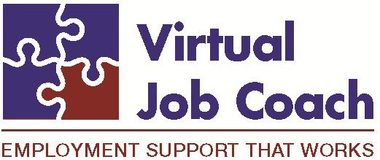Blog
Virtual Job Coach

By Cynthia Burrow
•
09 Jul, 2020
A handshake may seem like a simple gesture. But at a job interview, it is very important. It’s the first impression your potential employer will have of you in person. Some people might think a “weak” handshake shows that the person is timid and not very proactive. Some people might think an “aggressive” handshake shows that the person will be rigid and hard to work with. The problem is that not all people sense touch the same way. What may feel rough or aggressive to one person may feel soft to another. There is no “right” or “wrong” way for you to feel. However, you don’t want to make a negative impression simply because of your sensory differences. Here are a few rough guidelines about the handshake you give to a potential employer. Pressure: Aim for the amount of pressure you use to pick up a glass of water. Too little pressure, and the glass will slip through your hand. Too much pressure and you might break the glass! Time: Aim for no more than 1-2 seconds. But let the interviewer take the lead—if he or she continues shaking your hand for a little bit longer than that, don’t pull away suddenly. Practice: The best way to work on your handshake is to practice with others and get their feedback. Be sure to practice with several different people. They each may have a different impression of your handshake. So make sure you consider all the feedback you get. The handshake is the first and last impression you give at a job interview. Learning how to do it well will make you more confident and will ensure you make the best impression possible.

By Cynthia Burrow
•
09 Jul, 2020
These days, online job boards are one of the richest and most used sources for job leads. What could be easier that opening a web browser, clicking through some search fields, and finding a host of jobs you can apply for immediately? However, with the ease of using a job board comes a major pitfall: employment scams. An employment scam is a job listing that promises good work for good pay but often results in hard work for little or no pay. Here are some things to watch for when using an online job board. 1. Jobs that sound too good to be true probably are. Watch out for: • Work-from-home jobs • Jobs that require no experience • Jobs that promise an unrealistically high salary or use words like “earn up to” 2. Any employer that asks you to pay for anything related to the work is a scam. You might be asked to pay for training, supplies, etc. Once the company has your money, they may never contact you again or they may claim you failed to qualify for the job. Never give money or a credit card number to any company advertising a job. 3. Sometimes, the way a job posting looks can tip you off that it’s probably a scam. Postings in all capital letters or that use a lot of exclamation points, asterisks, or other symbols are not professional and could be scams. So how do you avoid employment scams? First, stick to reputable job boards. Reputable job boards are those that are run by government agencies or companies that have been in business a long time. Here are some places to start. 1. Job boards sponsored by your local, state, or the federal government typically have fewer scams than private, for-profit job boards. While these sites typically work hard to keep job postings honest, sometimes scams can sneak through and be posted before the job board can take them down. For example, USAJobs.gov is an official web site of the United States government. It has been active for over 20 years. Job seekers can browse government jobs available in all parts of the country. Most states and some large cities also have a workforce development agency that runs a state-wide or city-wide job board. These job boards focus on employment opportunities within your state and often allow you to search by region, city, or zip code. For example, in Texas, workintexas.com is run by the Texas Workforce Commission. 2. Private job boards that have been in business for a long time and have published policies to protect job seekers are another good bet. Three of the most reputable private job boards are monster.com , indeed.com and simplyhired.com . All three web sites have a published policy of protecting job seekers from employment scams. All three also offer helpful articles on how to avoid employment scams. However, all three sites also caution that there is no way to completely prevent or eliminate scam employment opportunities from their sites. Falling for an employment scam can be devastating. You could lose money, valuable job-searching time, and self-confidence. To avoid these scams, educate yourself about what to look for and how to protect yourself. The Virtual Job Coach is dedicated to arming our users with useful information to help them find good jobs. You can learn more about this topic in our unit “Finding Jobs to Apply For.”
Call us:
+1 0512 9968814
Subscribe to Our Newsletter
Thank you for contacting us.
We will get back to you as soon as possible.
We will get back to you as soon as possible.
Oops, there was an error sending your message.
Please try again later.
Please try again later.
Financial support for the Virtual Job Coach was provided by the Texas Council for Developmental Disabilities
through its Enabling Technology: Collaborating for the Future initiative, with federal funds* made available by the United States Department of Health and Human Services, Administration on Developmental Disabilities. * $224,967, 75% DD funds; 27,617, 25% non-federal resources.
Copyright © Strategic Education Solutions, LLC All Rights Reserved.
